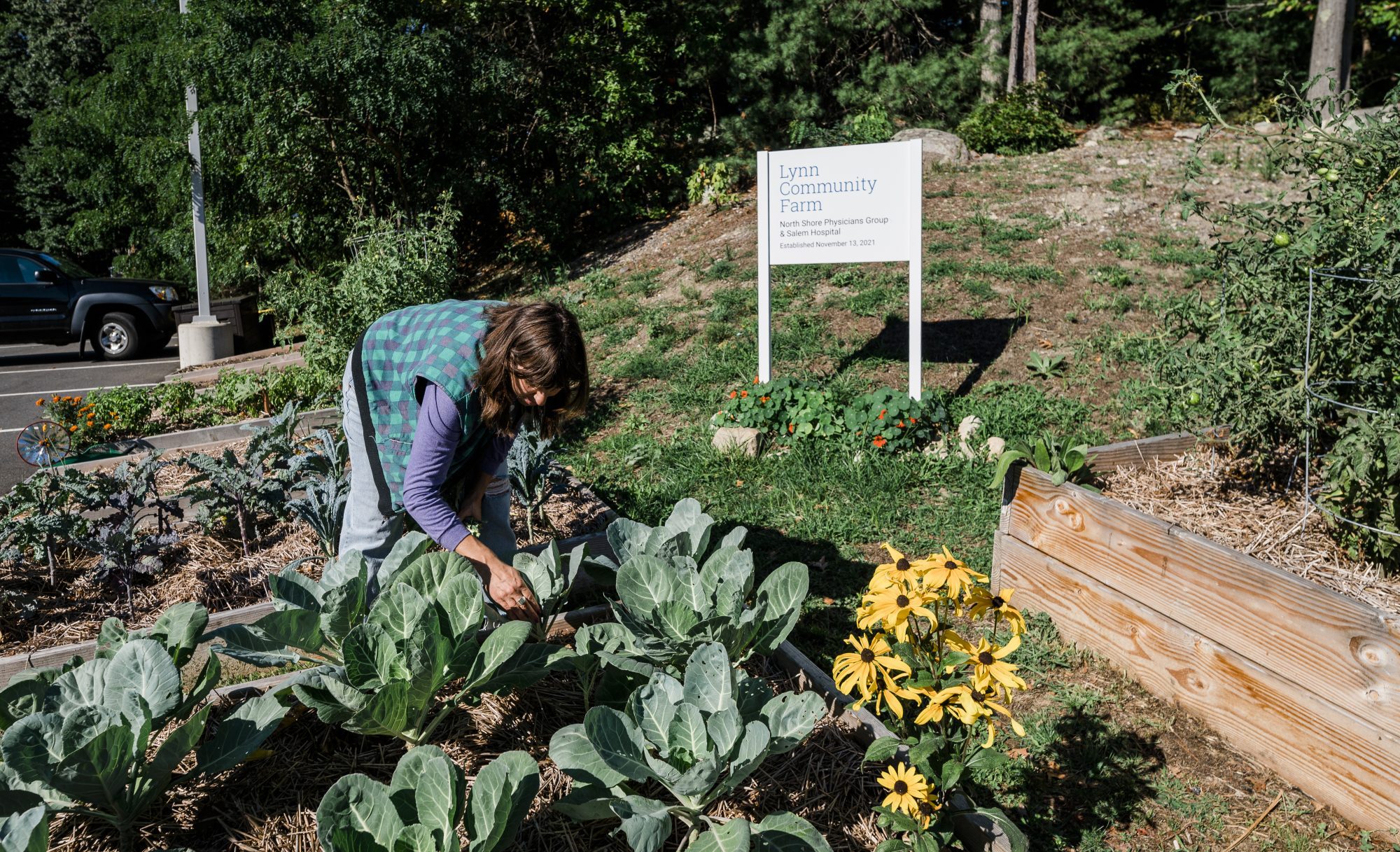LYNN — The North Shore Physicians Group partnered with North Shore non-profit The Food Project to grow greens and vegetables behind the North Shore Physicians Group building on Lynnfield Street in an effort to promote healthy eating.
“We’re looking for ways to get people access to fresh, healthy foods. So one of the things that they were seeing with their patients is that a lot of health issues come from diet, so this was conceived as a way of providing preventative care to people,” said Hazel Kiefer, lead farmer for The Food Project’s Newhall Fields Community Farm.
The 13 raised beds, which community gardeners and Food Project farmers built in the fall and planted in the spring, have already produced 150 pounds of organic produce for the outpatient clinic, Kiefer said.
“We just started planting them this spring, and a couple of them are maintained by community gardeners so they kind of maintain their own bed, like this bed right here. He [a community gardener] comes to harvest his tomatoes, he gets to maintain them. It’s great for him because he lives in an apartment building and doesn’t have access to a garden. This is his garden space,” Kiefer said. “We work with some volunteers out here to kind of weed and water the beds and then we’re taking the food from the beds and bringing it into the outpatient clinic every Thursday morning. So I just dropped off a bunch of food and people can take bags whenever they want. We’ve donated about 150 pounds of food so far this year.”
Dr. Adrienne Allen, the senior medical director of Quality and Safety at North Shore Physicians Group, said the rooftop garden at Boston Medical Center was the project’s initial inspiration.
“Food really is medicine and I’m a primary care doctor and so much of what we see every day is people trying to be healthy the best they can under the constraints of life. Boston Medical Center has a Food Garden on their roof and I went there probably about four years ago. We saw the great work they were doing, both supplying fresh, healthy food, organic food for their patients, and for their teaching kitchen […] that was where the idea came from,” Allen said.
Allen said that when the COVID-19 pandemic hit, it exacerbated pre-existing food insecurity problems, and shifted the community garden project into gear.
“When COVID hit, there was such a crisis of supply chain for food, and food inequity grew, we thought, ‘oh, now’s the time, let’s do this. Let’s grow food locally, to help support our patients to help bolster the morale locally, and to help the environment’ quite honestly, it’s healthier to eat things that are grown here without chemicals without pesticides, and to empower local organizations to kind of work together,” Allen said. “There are so many food deserts around and the idea that it costs more money to eat healthy than it does to eat junk is really an atrocity. We want to show people where food comes from.”
Dropping off bags of food to patients every Thursday, Kiefer said that she enjoys seeing patients’ reactions to freshly-grown food.
“I always love seeing how people respond to food, especially fresh food. I pick it the night before, and then they get it the next morning, so it smells really good, it looks really good. It’s still alive compared to what you get at a grocery store,” Kiefer said. “I had a woman last week who was up there when I was setting out the food and she was just so excited. She ended up taking like four different items with her. She was telling me how she was going to cook them. Just that reaction that people have to really fresh, beautiful food that they can tell someone has grown with care is really great.”
Although the garden is currently home to only 13 raised beds, Allen said that she encourages community members to get their own garden beds so that the project can expand into a “food forest.”
“We hope that more people will even take their own box. Right now, a lot of this, we’re growing together, but we hope to expand it so that if you don’t have the space, if you have an apartment, you can get a box, and grow what you want, and have autonomy to do the work. We hope that it grows into kind of like a food forest with some fruit trees and more boxes and more accessible boxes into the next development,” Allen said. “That’s the vision.”
Anthony Cammalleri can be reached at [email protected]

